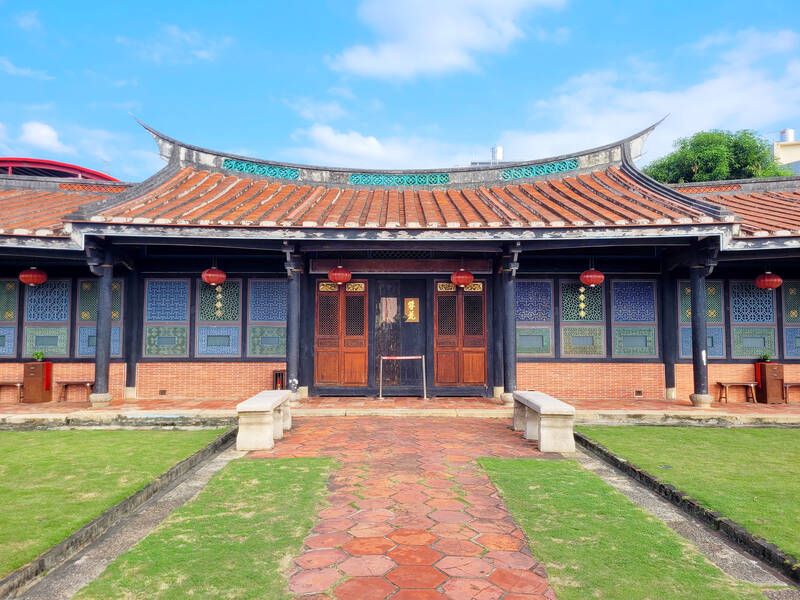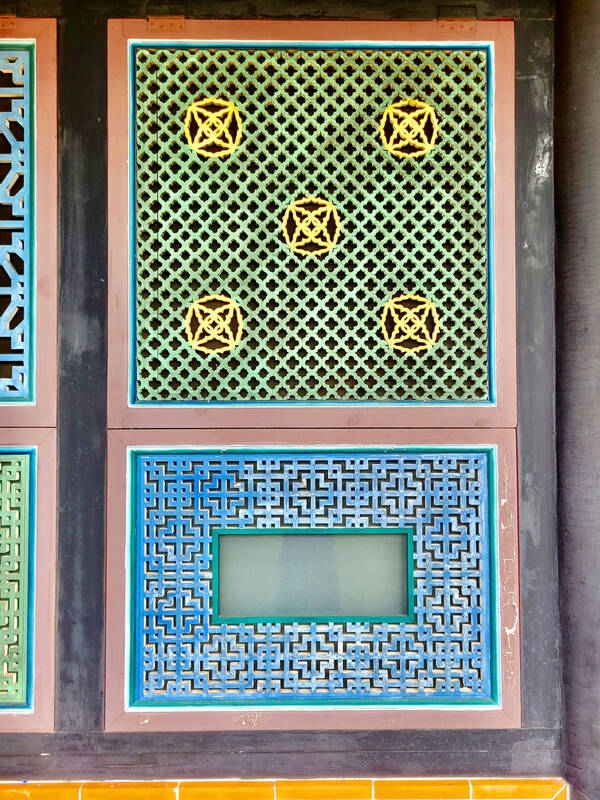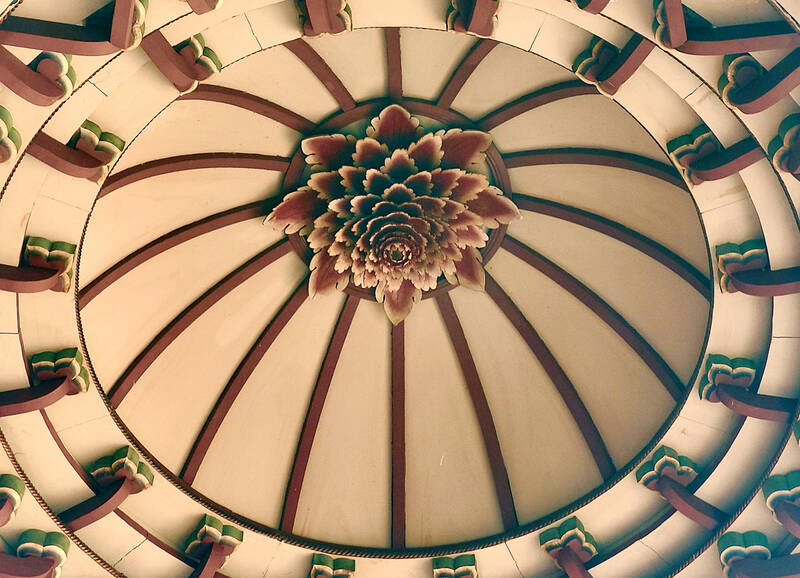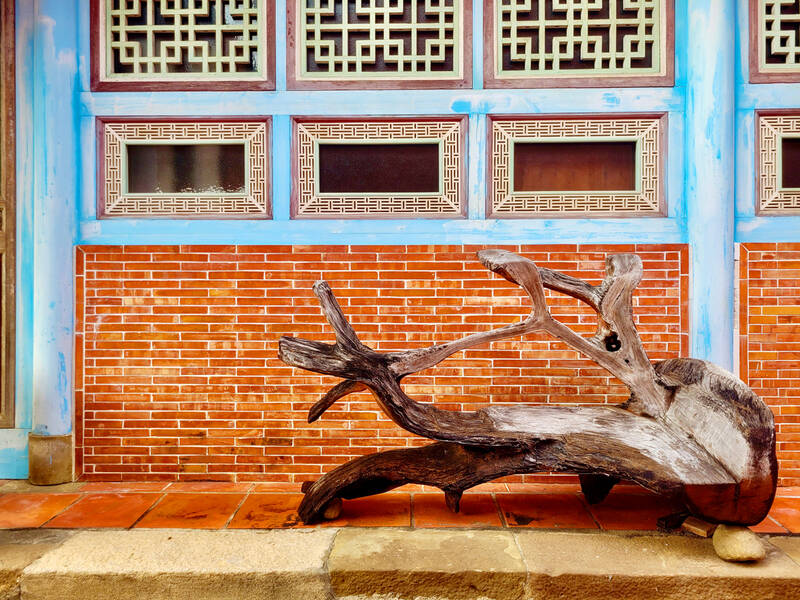When 17-year-old Lin Shih (林石) crossed the Taiwan Strait in 1746 with a group of settlers, he could hardly have known the magnitude of wealth and influence his family would later amass on the island, or that one day tourists would be walking through the home of his descendants in central Taiwan.
He might also have been surprised to see the family home located in Wufeng District (霧峰) of Taichung, as Lin initially settled further north in what is now Dali District (大里).
However, after the Qing executed him for his alleged participation in the Lin Shuang-Wen Rebellion (林爽文事件), his grandsons were taken south by their mother for a fresh start. Future generations of the Lin family did not rebel against the Qing, and were actually staunch supporters whose military exploits helped cement their fame and fortune.

Photo : Tyler Cottenie
EARLY DAYS
In the next (fourth) generation of the Lin family, the Wufeng property was split into an Upper House and a Lower House, perhaps simplifying family financial matters at the time but greatly complicating tourist visits today. On top of this, the Upper House has now been further divided into four sites managed by two different entities, with some requiring advance reservations. The Lower House property, however, is accessible in its entirety with one ticket and is the focus of this article.
On the north side of the Lower House grounds is the oldest extant home belonging to the Wufeng Lin family, the Caocuo (草厝), or “grass house”, so named due to its thatched roof. Damaged in the 1935 earthquake, it was finally meticulously restored and reopened to the public just five years ago. Originally built around 1837, this simple brick structure symbolizes the family’s humble beginnings, and stands in stark contrast to the adjacent multi-layered mansion.

Photo : Tyler Cottenie
The grass house itself does not require an entrance ticket, but the rest of the property does. Regular admission is NT$250, with discounts for children. Tickets can be purchased seven days a week between 9am and 12pm, and from 1pm to 4pm, with the property closing its doors at 5pm. Guided tours (Chinese only) can be booked ahead of time online at wufenglins.com.tw or joined if there is room without prior reservation. The paid portion of the visit begins with the central mansion next to the grass house.
Construction of this mansion was started by Lin Wen-cha (林文察), of the fifth Lin generation in Taiwan, and it is the only remaining residence of a first-rank Qing official in Taiwan. Lin Wen-cha was a successful military officer for the Qing who helped fight against the Taiping Heavenly Kingdom. After dying in battle, he was awarded the posthumous title of “Junior Guardian of the Crown Prince,” and so the house was named Gong-Bao-Di (宮保第), which translates to “Palace Guardian’s Residence” and can be seen on a beautiful colored plaque above the main entrance.
A FIVE-LAYERED-HOUSE

Photo : Tyler Cottenie
After passing through the main entrance and an indoor space, there is a courtyard and another entrance, followed by another courtyard and another entrance, followed by even more. When Lin Wen-cha’s son had expanded the home to its present size by 1895, it had a total of five “layers” (indoor spaces running left to right across the property) with four courtyards in between, making it one of the largest private residences in Taiwan.
The home is richly decorated with symbols for longevity and wealth that a guided tour will reveal. The pamphlet given out at the ticket counter also has a QR code linking to guided tour videos in passable English, which introduce some of these symbols.
When important visitors came to call on the Lins, their sedan chairs could be carried all the way through into the second layer, which was large enough to hold the chair during the guest’s visit. Guests were greeted by the head of the Lin household here, and escorted through the next courtyard into the third layer.

Photo : Tyler Cottenie
When such a guest was a suitor seeking the hand of a Lin girl in marriage, the girl could peek at the man through special windows on the side called “son-in-law windows.” This was the only chance the girl had to evaluate a suitor before the wedding.
The courtyard beyond the third layer seems especially large. This is because the fourth layer of the house was damaged in the infamous 1935 earthquake, so only the foundation remains today. Reconstruction of historical buildings must be based on visual records, but none exist for this part of the house, so reconstruction has not been possible.
The final layer of Gong-Bao-Di has never been open to the public. Initially, it was where the unmarried Lin females were housed. Nowadays, it serves as the ancestral hall for the Wufeng Lins. The exterior, however, is worth admiring on its own, especially the intricate woodwork covering the windows in alternating blue and green patches.
THE GRAND FLOWER HALL
If Gong-Bao-Di is representative of the Lin family’s military success, the Grand Flower Hall just to the south symbolizes their admiration for literature and the arts. It was erected by Lin Chao-tung (林朝棟), of the sixth generation, in the 1890s, at a time when the Lin family enjoyed exclusive rights for camphor exports from Taiwan and was at the peak of their wealth and influence.
The showpiece of this hall is the theatrical stage in the middle courtyard, now the only Fuzhou-style wooden stage in Taiwan. The best seat in the house for watching performances was directly across from the stage, in the formal living room area, where two chairs — one for the head of the household and one for the night’s most distinguished guest — sit in an alcove surrounded by exquisite wooden carvings.
Facing the stage from here during a daytime tour, what stands out immediately is the symmetry of the stage and the ornamental carved window at the back that fully fills the space between the two entrance curtains. In fact, very little of the entire structure is undecorated.
It’s unfortunate that the building is usually only open for tours during the day, because this stage would look even more impressive at night, with its sharply-angled swallow-tail roof lit up from below as it reaches upward into the black expanse of the heavens. For an idea of how this would look, check out the music video for Jolin Tsai’s (蔡依林) song I’m Not Yours, which was filmed right here, or sign up for the exclusive night tour coming up on Feb. 8.
The stage itself is not open to the public, but visitors may observe it up close from ground level. The stage’s ceiling features a massive hanging wooden peony — a favorite decoration throughout the Lin family’s residence — in a multi-level recessed octagonal space. Underneath the stage are several earthenware jars. These would have been filled with water during performances to serve as resonators, naturally amplifying sounds from the stage.
This is the full extent of the Wufeng Lin family’s Lower House that is open to the public. If you have time, you may also want to check out the Upper House properties, including the Yipu Mansion next door or the Lin garden at the nearby Mingtai High School, neither of which require advance reservations.

This month the government ordered a one-year block of Xiaohongshu (小紅書) or Rednote, a Chinese social media platform with more than 3 million users in Taiwan. The government pointed to widespread fraud activity on the platform, along with cybersecurity failures. Officials said that they had reached out to the company and asked it to change. However, they received no response. The pro-China parties, the Chinese Nationalist Party (KMT) and Taiwan People’s Party (TPP), immediately swung into action, denouncing the ban as an attack on free speech. This “free speech” claim was then echoed by the People’s Republic of China (PRC),

Exceptions to the rule are sometimes revealing. For a brief few years, there was an emerging ideological split between the Democratic Progressive Party (DPP) and Chinese Nationalist Party (KMT) that appeared to be pushing the DPP in a direction that would be considered more liberal, and the KMT more conservative. In the previous column, “The KMT-DPP’s bureaucrat-led developmental state” (Dec. 11, page 12), we examined how Taiwan’s democratic system developed, and how both the two main parties largely accepted a similar consensus on how Taiwan should be run domestically and did not split along the left-right lines more familiar in

Specialty sandwiches loaded with the contents of an entire charcuterie board, overflowing with sauces, creams and all manner of creative add-ons, is perhaps one of the biggest global food trends of this year. From London to New York, lines form down the block for mortadella, burrata, pistachio and more stuffed between slices of fresh sourdough, rye or focaccia. To try the trend in Taipei, Munchies Mafia is for sure the spot — could this be the best sandwich in town? Carlos from Spain and Sergio from Mexico opened this spot just seven months ago. The two met working in the

Many people in Taiwan first learned about universal basic income (UBI) — the idea that the government should provide regular, no-strings-attached payments to each citizen — in 2019. While seeking the Democratic nomination for the 2020 US presidential election, Andrew Yang, a politician of Taiwanese descent, said that, if elected, he’d institute a UBI of US$1,000 per month to “get the economic boot off of people’s throats, allowing them to lift their heads up, breathe, and get excited for the future.” His campaign petered out, but the concept of UBI hasn’t gone away. Throughout the industrialized world, there are fears that